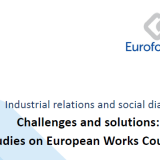
Employee representation
Employee representation may be defined as the right of employees to seek a union or individual to represent them for the purpose of negotiating with management on such issues as wages, hours, benefits and working conditions. In the workplace, workers may be represented by trade union and through works councils – or similar structures elected by all employees. EU law has established rights and obligations for employees and their representatives to be informed and consulted via a set of directives that provide for the information and consultation of the workers, at both national and international level.










